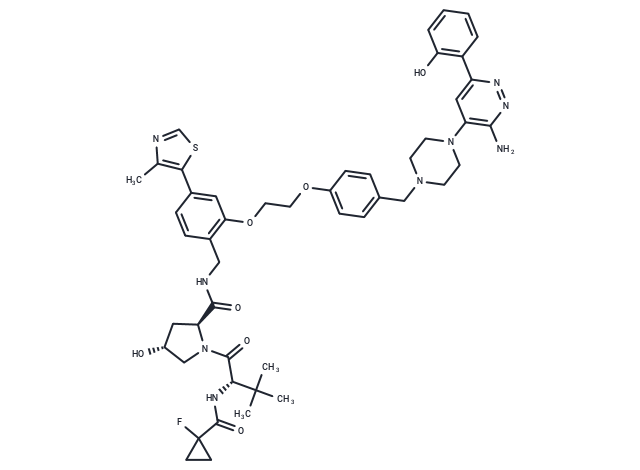Shopping Cart
Remove All Your shopping cart is currently empty
Your shopping cart is currently empty
ACBI1 is a potent PROTAC degrader of BAF ATPase subunits SMARCA2 and SMARCA4, also degrades the polybromo-associated BAF (PBAF) complex member PBRM1, with DC50s of 6 nM, 11 nM and 32 nM for SMARCA2, SMARCA4 and PBRM1 in MV-4-11 cells, respectively. ACBI1 is composed of a bromodomain ligand, a linker, and the E3 ubiquitin ligase VHL. ACBI1 can induce anti-proliferative effects and apoptosis.

| Pack Size | Price | USA Warehouse | Global Warehouse | Quantity |
|---|---|---|---|---|
| 1 mg | $98 | In Stock | In Stock | |
| 5 mg | $237 | In Stock | In Stock | |
| 10 mg | $382 | In Stock | In Stock | |
| 25 mg | $639 | In Stock | In Stock | |
| 50 mg | $913 | In Stock | In Stock | |
| 100 mg | $1,230 | In Stock | In Stock |
| Description | ACBI1 is a potent PROTAC degrader of BAF ATPase subunits SMARCA2 and SMARCA4, also degrades the polybromo-associated BAF (PBAF) complex member PBRM1, with DC50s of 6 nM, 11 nM and 32 nM for SMARCA2, SMARCA4 and PBRM1 in MV-4-11 cells, respectively. ACBI1 is composed of a bromodomain ligand, a linker, and the E3 ubiquitin ligase VHL. ACBI1 can induce anti-proliferative effects and apoptosis. |
| Targets&IC50 | SMARCA4:11 nM (DC50), PBRM1:32 nM (DC50), SMARCA2:6 nM (DC50) |
| Molecular Weight | 936.1 |
| Formula | C49H58FN9O7S |
| Cas No. | 2375564-55-7 |
| Smiles | NC1=C(C=C(N=N1)C2=C(O)C=CC=C2)N3CCN(CC4=CC=C(OCCOC5=C(CNC(=O)[C@H]6N(C([C@@H](NC(=O)C7(F)CC7)C(C)(C)C)=O)C[C@H](O)C6)C=CC(=C5)C8=C(C)N=CS8)C=C4)CC3 |
| Relative Density. | 1.41 g/cm3 (Predicted) |
| Storage | Powder: -20°C for 3 years | In solvent: -80°C for 1 year | Shipping with blue ice/Shipping at ambient temperature. | |||||||||||||||||||||||||||||||||||
| Solubility Information | DMSO: 100 mg/mL (106.83 mM), Sonication is recommended. | |||||||||||||||||||||||||||||||||||
| In Vivo Formulation | 10% DMSO+40% PEG300+5% Tween 80+45% Saline: 4 mg/mL (4.27 mM), Sonication is recommended. Please add the solvents sequentially, clarifying the solution as much as possible before adding the next one. Dissolve by heating and/or sonication if necessary. Working solution is recommended to be prepared and used immediately. The formulation provided above is for reference purposes only. In vivo formulations may vary and should be modified based on specific experimental conditions. | |||||||||||||||||||||||||||||||||||
Solution Preparation Table | ||||||||||||||||||||||||||||||||||||
DMSO
| ||||||||||||||||||||||||||||||||||||
| Size | Quantity | Unit Price | Amount | Operation |
|---|

Copyright © 2015-2026 TargetMol Chemicals Inc. All Rights Reserved.